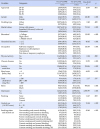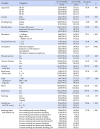Abstract
Purpose
The purpose of this study was to investigate the combined influence of smoking and alcohol drinking on suicidal ideation and attempts among Korean adults.
Methods
This cross sectional study used secondary data from the Korean National Health and Nutrition Examination Survey (KNHANES) from 2008 to 2011. A total of 13,064 adults were included in the study. Logistic regression was used to analyze the combined influence of smoking and alcohol drinking on suicidal ideation and attempts.
Results
Persons who smoke and use alcohol were more likely to report suicidal ideation and attempts than those who did not smoke and reported normal drinking. The group who reported both smoking and harmful drinking/alcohol had significantly higher incidence of suicidal ideation and attempts than the comparison group of non-smoking/normal drinking (Suicidal ideation: Adjusted Odds Ratio [AOR]: 2.13, 95% Confidence Interval [CI]: 1.60~2.83; suicidal attempts: AOR: 3.81, 95% CI: 1.60~9.05).
Conclusion
Based on the results of this study, smoking and alcohol drinking were individually important health behaviors for prevention of suicidal ideation and attempts. Especially, suicidal prevention programs might be needed for adults who smoke and drink at the same time to decrease suicidal ideation and attempt.
Figures and Tables
References
1. OECD. “Suicides”, in OECD Factbook 2015-2016: Economic, Environmental and Social Statistics. Paris: OECD Publishing;2016. http://dx.doi.org/10.1787/factbook-2015-88-en.
2. Korea Statistical Information Service. 2014 Cause of death statics (nationwide). [Internet]. Seoul: Ministry of Health & Welfare. Korea Statistical Information Service;2015. Cited 2015 August 3. Available from: http://kosis.kr/statisticsList/statisticsList_01List.jsp?vwcd=MT_ZTITLE&parentId=D#SubCont.
3. Bae HC, Hong SR, Jang SI, Lee KS, Park EC. Patterns of alcohol consumption and suicidal behavior: findings from the fourth and fifth Korea national health and nutritional examination survey (2007-2011). J Prev Med Public Health. 2015; 48:142–150. DOI: 10.3961/jpmph.14.027.

4. Crosby AE, Beth H, Ortega LAG, Parks SE, Gfroerer J. Suicidal thoughts and behaviors among adults aged ≥18 years - United States, 2008-2009. MMWR Surveill Summ. 2011; 60(13):1–22.
5. Park E, Choi SJ. Prevalence of suicidal ideation and related risk factors among Korean adults. J Korean Acad Psychiatr Ment Health Nurs. 2013; 22(2):88–96. DOI: 10.12934/jkpmhn.2013.22.2.88.

6. Chakravorty S, Grandner MA, Mavandadi S, Perlis ML, Sturgis EB, Oslin DW. Suicidal ideation in veterans misusing alcohol: relationships with insomnia symptoms and sleep duration. Addict Behav. 2014; 39(2):399–405. DOI: 10.1016/j.addbeh.2013.09.022.

7. Engelberg H. Low serum cholesterol and suicide. Lancet. 1992; 339(8795):727–729. DOI: 10.1016/0140-6736(92)90609-7.

8. Park YM, Lee BH, Lee SH. The association between serum lipid levels, suicide ideation and central serotonergic activity in patients with major depressive disorder. J Affect Disord. 2014; 159:62–65. DOI: 10.1016/j.jad.2014.01.016.

9. Shin YR, Lee HY, So ES. Suicidal ideation and associated factors by sex in Korean adults: a population-based cross-sectional survey. Int J Public Health. 2011; 56(4):429–439. DOI: 10.1007/s00038-011-0245-9.

10. Conner KR, Bagge CL, Goldston DB, Ilgen MA. Alcohol and suicidal behavior: what is known and what can be done. Am J Prev Med. 2014; 47:3 Suppl 2. S204–S208. DOI: 10.1016/j.amepre.2014.06.007.
11. Pompili M, Serafini G, Innamorati M, Dominici G, Ferracuti S, Kotzalidis GD, et al. Suicidal behavior and alcohol abuse. Int J Environ Res Public Health. 2010; 7(4):1392–1431. DOI: 10.3390/ijerph7041392.

12. Choi H, Seo JS, Pyo JY, Park YH. Correlation of alcohol intake with suicide in cases confirmed by legal autopsy. Korean J Leg Med. 2012; 36:63–67. DOI: 10.7580/KoreanJLegMed.2012.36.1.63.

14. Hintikka J, Koivumaa-Honkanen H, Lehto SM, Tolmunen T, Honkalampi K, Haatainen K, et al. Are factors associated with suicidal ideation true risk factors? A 3-year prospective follow-up study in a general population. Soc Psychiatry Psychiatr Epidemiol. 2009; 44:29–33. DOI: 10.1007/s00127-008-0401-6.
15. Iwasaki M1, Akechi T, Uchitomi Y, Tsugane S. Cigarette smoking and completed suicide among middle-aged men: a population-based cohort study in Japan. Ann Epidemiol. 2005; 15(4):286–292. DOI: 10.1016/j.annepidem.2004.08.011.

16. Miller M, Borgers G, Orozco R, Mukamal K, Rimm EB, Benjet C, et al. Exposure to alcohol, drugs and tobacco and the risk of subsequent suicidality: findings from the Mexican Adolescent Mental Health Survey. Drug Alcohol Depend. 2011; 113(2-3):110–117. DOI: 10.1016/j.drugalcdep.2010.07.016.

17. Sharma R, Lodhi S, Sahota P, Thakkar MM. Nicotine administration in the wake-promoting basal forebrain attenuates sleep promoting effects of alcohol. J Neurochem. 2015; 135(2):323–331. DOI: 10.1111/jnc.13219.
18. Brady J. The association between alcohol misuse and suicidal behavior. Alcohol Alcohol. 2006; 41(5):473–478. DOI: 10.1093/alcalc/agl060.
19. John U, Meyer C, Rumpf HJ, Hapke U. Probabilities of alcohol high-risk drinking, abuse or dependence estimated on grounds of tobacco smoking and nicotine dependence. Addiction. 2003; 98(6):805–814. DOI: 10.1046/j.1360-0443.2003.00381.x.

20. Schneider B, Baumert J, Schneider A, Marten-Mittag M, Meisinger C, Erazo N, et al. The effect of risky alcohol use and smoking on suicide risk: findings from the German MONICA/ KORAAugsburg Cohort Study. Soc Psychiatry Psychiatr Epidemiol. 2011; 46:1127–1132. DOI: 10.1007/s00127-010-0287-y.
21. Jeon HS. Effects of smoking, drinking and drug use on the adolescent's suicidal ideation by using the data of the Korea youth risk behavior web-based survey through from 2008 to 2014. J Korean Soc Sch Health. 2014; 28(2):99–110. DOI: 10.15434/kssh.2015.28.2.99.
22. Kang KW, Sung JH, Kim CY. High risk groups in health behavior defined by clustering of smoking, alcohol, and exercise habits: national heath and nutrition examination survey. J Prev Med Public Health. 2010; 43(1):73–83. DOI: 10.3961/jpmph.2010.43.1.73.

23. Jeong JO. The second plan for suicide prevention in Japan. Health Welf Policy Forum. 2013; 06. Report No.: 200_03. http://repository.kihasa.re.kr:8080/handle/201002/10534.
24. Lee SY. Policy options for the improvement of suicide prevention programs. Health Welf Policy Forum. 2015; 11:34–49.
25. Kim YJ. Risk and protection factor related to suicide ideation in each life course based on an ecological-system perspective. Korean J Community Living Sci. 2011; 22(3):429–444.

26. Min KB, Park SG, Hwang SH, Min JY. Precarious employment and the risk of suicidal ideation and suicide attempts. Prev Med. 2015; 71:02. 72–76. DOI: 10.1016/j.ypmed.2014.12.017.

27. Takada M, Suzuki A, Shima S, Inoue K, Kazukawa S, Hojoh M. Associations between lifestyle factors, working environment, depressive symptoms and suicidal ideation: a large-scale study in Japan. Ind Health. 2009; 47(6):649–655. DOI: 10.2486/indhealth.47.649.

28. Berlin I, Hakes JK, Hu MC, Covey LS. Tobacco use and suicide attempt: longitudinal analysis with retrospective reports. PLOS one. 2015; 10(4):e0122607. DOI: 10.1371/journal.pone.0122607.





 PDF
PDF ePub
ePub Citation
Citation Print
Print





 XML Download
XML Download